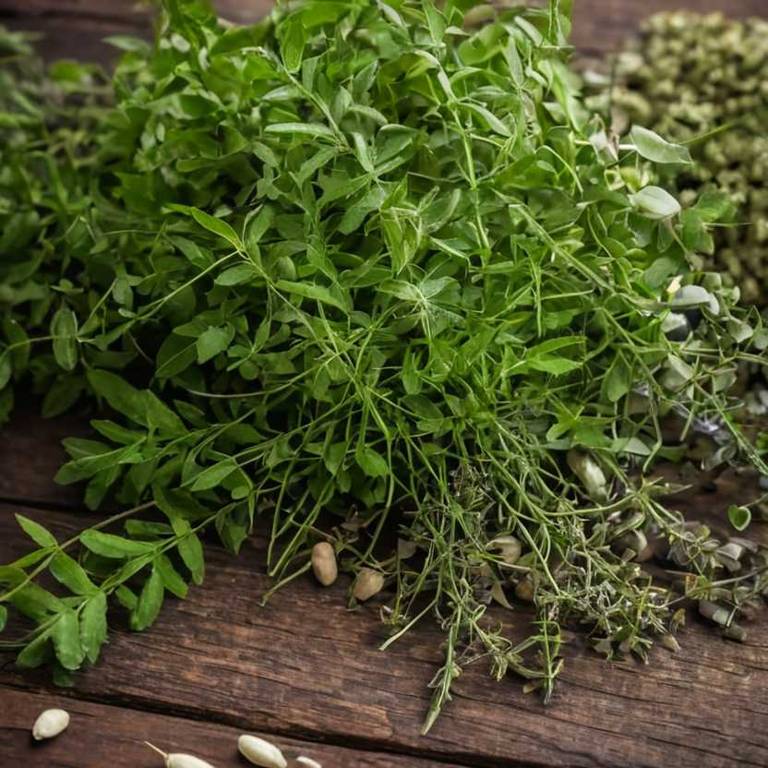By Leen Randell
Updated: Jul 07, 2024
What Are The Medicinal Properties Of Phyllanthus Amarus (Phyllanthus)?

Phyllanthus amarus, also known as phyllanthus, has health benefits such as treating liver and kidney problems, and it has anti-inflammatory properties.
The medicinal constituents of phyllanthus include flavonoids, alkaloids, and saponins, which contribute to its therapeutic effects. Phyllanthus preparations include infusions, decoctions, and tablets, which are used to treat a range of conditions. Potential side effects of phyllanthus use include skin rashes and digestive issues.
When using phyllanthus, precautions should be taken to avoid interactions with other medications and to consult with a healthcare professional before use.
This article explains the health benefits, active constituents, medicinal preparations, possible side effects, and precautions related to Phyllanthus amarus.
- What are the health benefits of Phyllanthus amarus?
- What are the active constituents of Phyllanthus amarus?
- What are the medicinal preparations of Phyllanthus amarus?
- What are the possible side effect of using Phyllanthus amarus improperly?
- What precautions to take when using Phyllanthus amarus medicinally?
What are the health benefits of Phyllanthus amarus?
Phyllanthus amarus, also known as phyllanthus, has health benefits such as reducing inflammation and improving liver function.
The herb has been traditionally used to treat liver and kidney problems, and has shown potential in treating conditions like hepatitis and jaundice. Its antioxidant properties also help protect against oxidative stress and cell damage, which can contribute to chronic diseases like cancer and diabetes.
Regular consumption may also boost immune function and overall well-being.
Here's a detailed article about the 10 health benefits of Phyllanthus amarus.
What are the active constituents of Phyllanthus amarus?
Phyllanthus amarus, also known as phyllanthus, has active constituents such as flavonoids, terpenoids, and alkaloids.
The most significant compound isolated from phyllanthus is phyllanthin, which has been reported to exhibit hepatoprotective and anti-inflammatory activities. Additionally, phyllanthus amarus contains various phenolic compounds like gallic acid, ellagic acid, and ferulic acid, which contribute to its medicinal properties and antioxidant potential.
These compounds are believed to be responsible for the herb's therapeutic effects.
Here's a detailed article about the 10 active constituents of Phyllanthus amarus.
What are the medicinal preparations of Phyllanthus amarus?
Phyllanthus amarus, also known as phyllanthus, has medicinal preparations such as extracts, tablets, and capsules.
The plant's leaves and roots are used to prepare various concoctions, including tonics and syrups, for treating liver disorders, fever, and digestive problems. Traditional healers also use it to manage kidney stones, gout, and as an anti-inflammatory agent.
Its extracts are also used in modern medicine for antiviral, antibacterial, and antifungal activities.
Here's a detailed article about the 10 medicinal preparations of Phyllanthus amarus.
What are the possible side effect of using Phyllanthus amarus improperly?
Improper use of Phyllanthus amarus, also known as phyllanthus, increases the chances of experiencing side effects such as nausea, dizziness, and gastrointestinal problems.
In some cases, it may also cause skin rashes, fever, and allergic reactions.
The herb's diuretic properties can lead to an imbalance of electrolytes, while prolonged use may result in kidney damage or liver problems in rare instances.
Here's a detailed article about the 10 most common side effects of Phyllanthus amarus.
What precautions to take when using Phyllanthus amarus medicinally?
Before using Phyllanthus amarus, also known as phyllanthus, for medicinal purposes, you must take precautions such as consulting a qualified healthcare professional to determine the safe dosage and potential interactions with other medications.
Pregnant or breastfeeding women should avoid using phyllanthus due to its potential effects on the fetus or baby.
Also, individuals with liver or kidney disease should exercise caution when using phyllanthus, as it may worsen these conditions.
Here's a detailed article about 10 precautions to take when using Phyllanthus amarus.